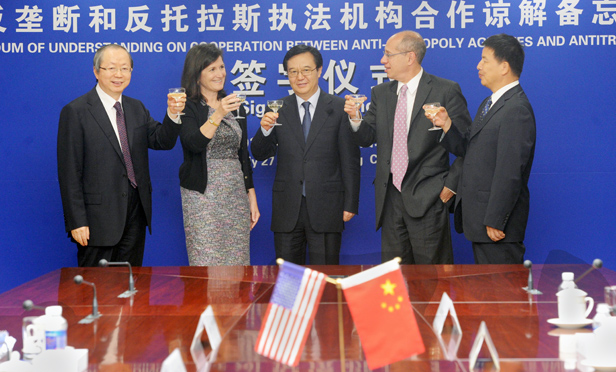More than two months after his company announced that it was under investigation by Chinese antitrust authorities, Qualcomm Inc. chief executive officer Paul Jacob said in a January interview that he still didn’t know why. Meanwhile, China’s National Development and Reform Commission, which is reportedly seeking a record $1 billion fine against the U.S. mobile chipmaker, has said it has “substantial evidence” against the company but has yet to offer any details of its probe.
Last year was a year of record fines imposed by Chinese antitrust regulators, and many of those were handed out to foreign multinationals. The secrecy of the process and suspicions of political motives have raised alarm bells in the international business community about how China plans to wield its now five-year-old Antimonopoly Law.
The law is actually enforced by three different government bodies in China. The Ministry of Commerce reviews mergers, while the State Administration for Industry and Commerce investigates monopolistic behavior. It is the activities of the third body, the NDRC, which targets price collusion, that have attracted most of the attention in the past year.
In January 2013 the NDRC imposed a total of $56 million fines on two Korean and four Taiwanese liquid crystal display makers. Last August the commission imposed a record $109 million fine on one Chinese and five foreign makers of infant formula, also for price-fixing.
Citing both cases, François Renard, a Beijing counsel and head of China antitrust practice at Allen & Overy, says that it definitely looks like the government is specifically targeting international companies in these proceedings. In the infant formula probe, he says the NDRC has publicly acknowledged investigating nine companies before fining six. But Renard says many more, mainly domestic, companies seem to have been exempted from scrutiny.
“We don’t know what the authorities have found out about these other companies,” he says. “It would be helpful if we knew that they have been properly investigated and cleared, but we don’t.”
Renard notes that Chinese companies are not exempt from antitrust investigations. Last March, Kweichow Moutai Co. Ltd. and Wuliangye Yibin Co. Ltd., China’s two biggest state-owned liquor companies, were fined a combined $74.2 million for setting minimum prices for distributors. State-owned telecommunication companies China Telecom Corp. Ltd. and China United Network Communications Group Co. Ltd. were also investigated for alleged price-fixing.
Politics is definitely a factor in the industries the Chinese government is targeting, says Nathan Bush, a Beijing partner with O’Melveny & Myers. The NDRC has so far focused mainly on sectors that are either important to achieving China’s economic goals or are seen as having a major impact on the lives of ordinary Chinese consumers. Infant formula and telecom services fall squarely in the latter category, as rising prices for both have prompted widespread public complaint.
Of course, those sectors important to Chinese economic development or to Chinese consumers are precisely those that have attracted a disproportionate volume of foreign investment.





